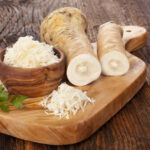Suppress tumor growth and fight cancer with THIS pungent herb
 (NaturalHealth365) Looking for another healthy food to add to your weekly grocery list? One popular root might be your next best bet, especially once you learn of its impressive health benefits.
(NaturalHealth365) Looking for another healthy food to add to your weekly grocery list? One popular root might be your next best bet, especially once you learn of its impressive health benefits.
From offering cancer-fighting properties to alleviating sinus discomfort, horseradish contains compounds that research suggests may be as strong as the plant’s classic flavor when it comes to boosting human health.
We use this popular root for its flavor – but did you know it contains compounds that may help fight cancer cell growth?
Known for its strong odor and flavor, horseradish (Armoracia rusticana) has generations of culinary and traditional medicinal history behind it. A member of the mustard family, horseradish is a perennial root resembling a parsnip and typically grows between 6 to 15 inches long, while the entire plant itself may grow up to 3 feet). It’s thought to have originated in southeastern Europe and was introduced to the United States around the 1850s by immigrants who settled in the Midwest, where you can still find it growing in the wild today.
Its hallmark flavor isn’t the only reason people can enjoy horseradish. A recent review published in the scientific journal Horticulturae describes a wide range of purported health benefits offered by the root, thanks to the biologically active compounds and phytochemicals it contains, including antioxidants and flavonoids.
As researcher Stuart Alan Walters writes in his 2021 paper, “Horseradish: A Neglected and Underutilized Plant Species for Improving Human Health,” some of horseradish’s most beneficial bioactive compounds include:
- Glucosinolates, which have been shown by research to have a preventive and inhibitory effect on various types of cancers, including cancers of the breast, colon, lung, pancreas, prostate, and stomach (note: horseradish contains 10 times more glucosinolates than broccoli, another revered healthy food)
- Isothiocyanates, a breakdown product of glucosinolates, which offer powerful antibacterial and antiseptic properties
- Enzymes, which have been shown to help stimulate digestion, reduce constipation, and help regulate bowel movements (horseradish also contains some fiber, another important factor in a healthy gut)
Historically, horseradish has been used medicinally to assist with a wide range of health conditions, including sinus infections, urinary tract infections, anemia, rheumatism, and bronchitis.
Discover a Simple and Effective Way to Remove Toxins: This is Jonathan's #1 choice for at-home detoxification. Special offer ends Feb. 16.
By the way, if you’ve ever wondered how exactly the horseradish root gets its telltale pungent odor, it’s because of an oil that gets released from cells when the root is damaged in some way – chopped, minced, grated, etc. Once the oil is released, sulfur in the oil mixes with air and causes a chemical reaction that can elicit that eye-watering scent.
Ways to use horseradish in your daily diet
So, do you want to start incorporating this healthy food into your diet but aren’t sure how to go about it? Try this:
- Grate fresh horseradish over your favorite meals, such as grass-fed beef, smoked fish, pork, or even vegetables like potatoes and potato salads (tip: fresh horseradish is very strong, so try mixing it with a bit of fresh lemon juice or vinegar to cut the taste)
- Mix with other condiments, such as organic sour cream, ketchup, mustard, homemade mayonnaise, or grass-fed butter
- If you’re worried about your horseradish garnish being too strong, don’t want to deal with prepping and storing your root, or simply can’t find it in its natural form, feel free to buy condiments or sauces with horseradish already in it – just try to find brands that don’t contain a lot of added sugars and are made with quality ingredients
Around 3-4 grams of fresh horseradish is considered by many to be a sufficient daily dose for health purposes. But be aware that the root is quite strong, so you might want to start in smaller quantities and build up. Also, some resources, such as the Health Information Library of PeaceHealth, advise that horseradish should be avoided in people with certain health conditions, like peptic ulcers, kidney disease, and hypothyroidism.
Better to be safe than sorry: if you’re currently pregnant, breastfeeding, or under medical supervision for a diagnosed health condition, chat with your integrative healthcare provider before adding horseradish to your diet.
Sources for this article include:
MDPI.com
Peacehealth.org
Lifeextension.com
Healthline.com
Harvesttotable.com



